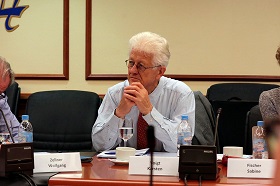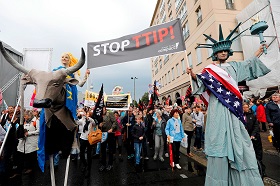On September 12, 2016 the Russian International Affairs Council together with the German Council on Foreign Relations (DGAP) held a seminar “Renewing Mechanisms for Russia-EU Cooperation.” Karsten Voigt, Member of the Board of the German Council on Foreign Relations, shared with RIAC Website editor Maria Smekalova his opinion on the US elections affecting the Germany-US elections and the reasons behind TTIP ratification failure.
On September 12, 2016 the Russian International Affairs Council together with the German Council on Foreign Relations (DGAP) held a seminar “Renewing Mechanisms for Russia-EU Cooperation.” Karsten Voigt, Member of the Board of the German Council on Foreign Relations, shared with RIAC Website editor Maria Smekalova his opinion on the US elections affecting the Germany-US elections and the reasons behind TTIP ratification failure.
You have a lot of experience in US-Germany relations. Are the US-Germany relations likely to change after the US presidential elections?
Whoever governs the United States, it is our most important partner outside of the European Union. During the Cold War the United States was the key partner, but over the decades the European Union has grown in importance and has become our priority. Naturally, therefore we are very much concentrated on the election campaign in the United States. If you ask Germans, only 5% of the population supports Trump.
As far as I know, it is almost opposite to the attitude in Russia. You look at the United States in the context of your global goal. You listen to the negative remarks from Hillary Clinton about Russia, then you look about and concentrate on the positive once from Donald Trump. We look at things differently. The US-Russia relations is only one aspect of our ties with the United States, which have many more sides.
Many Germans concentrate on domestic projects, which they cannot identify with Trump because he reminds many Germans of the Alternative for Germany and other right wing populist groups. There are some people who support these right wing groups but not so many as in France. What is more, Obama has had a very close cooperation with the European Union, and Hillary will continue his policy. Therefore, for understandable reasons we come to different conclusions than Russians.
If Trump does win, what happens then?
If Trump wins, we have a problem. We will have to find out what he really wants to implement inside his policy because it’s not very clear at this point. We have to manage that relationship. I was German-American coordinator in the German government during Bush years. With Bush Sr. during the time of German unification we got along very well but with Bush Jr. we had serious problems and serious conflicts, especially about the Iraq war, as Germany did not support the invasion. If Trump is elected, which I don’t hope, we will have to deal with serious issues and work on our relationship.
This what you have to think about in politics: first to understand why another country or politician comes to different conclusions, and then try to solve the problem.
The free trade zone talks between the US and the European Union seem to have failed. Why did that happen?
I’m not sure whether the talks have failed to the final end. What has failed is the expectation that we will reach a compromise before the American elections. I am not sure, whether this means that there is no compromise possible later on, but the reason is very clear. On both sides of the Atlantic, there is a desire to cooperate not only in security area but also in trade. At the same time the financial crisis echoes in protectionism both within the US and Europe. In Germany the majority of the population is against such a free trade agreement for the time being. I’m in favor but most Germans are against TTIP as they fear to lose some elements of the their identity.
The important thing is that TTIP is not only about trade and customs, it’s about standards. When it comes to standards: environmental, labor or cultural standards (which the French fear the most) most countries are afraid of losing their identity to the strength of the United States and try to protect themselves. Interestingly enough, while TTIP will not be concluded during this year and while the majority of Germans are against it, CETA (the Canadian-European Trade Agreement) will embark on the ratification process. We shall see what comes out of it, what experience we will have and whether this will have an impact on the TTIP as well. And anyhow, a lot of American companies are working via Canada, so there is a transatlantic aspect beyond Canada in this CETA agreement.
Interviewed by Maria Smekalova, RIAC Website editor





